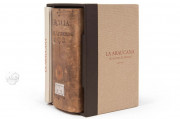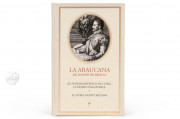The Araucaniad (1569, 1578, and 1589) is an epic poem by the Spaniard Alonso de Ercilla that recounts the first phase of the Arauco War between Spaniards and Mapuches. According to the author himself, who participated in the conflict, the poem was written during his stay in Chile using, as a substitute for paper, tree barks and other rustic elements. Ercilla, who, as a former page at the court of Philip II, had an education greater than that of the average conqueror, had arrived in the country as part of the reinforcement expedition commanded by the new governor García Hurtado de Mendoza. After Ercilla's return to Spain, the book was published in Madrid in three parts over two decades. The first volume was edited in 1569, the second in 1578, and the third in 1589. The book then achieved considerable success among readers.
Although the historicity of many of the accounts that appear in the work is relative, it is considered one of the most significant testimonial writings about the conquest, and at the time it was commonly read as a true chronicle of the events in Chile. The Araucaniad had been preceded by a large number of Spanish texts that described the New World to European readers, but distinguished itself among these books as the first work of cultured literature, dedicated to the theme with clear artistic ambitions. Following its publication, a great number of works on American themes emerged that imitated its poetic style.
The plot includes historical episodes such as the capture and execution of Pedro de Valdivia, and the death of the Mapuche chiefs Lautaro and Caupolicán. But there are also fantastic events, such as that of a sorcerer who lifts the narrator in a flight over the Earth, allowing him to see events happening in Europe and the Middle East, such as the Battle of Lepanto. Also notable is the episode of the encounter with an indigenous woman, Tegualda, who searches for her husband Crepino among the dead on a battlefield. This last tale is a demonstration of the humanistic aspect of Ercilla's work, and of his sympathy for the fate of the indigenous people, whom he describes as people who were free of vices and malice until the Spaniards arrived. The verses praise the bravery of both conquerors and indigenous people.
We have 1 facsimile edition of the manuscript "Araucaniad": La Araucana facsimile edition, published by Testimonio Compañía Editorial, 2011
Request Info / Price





